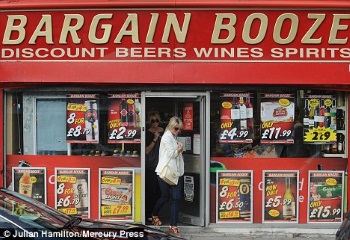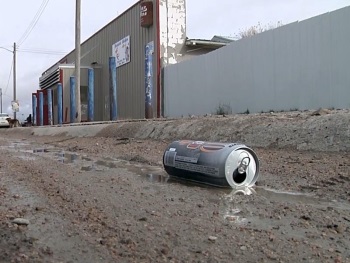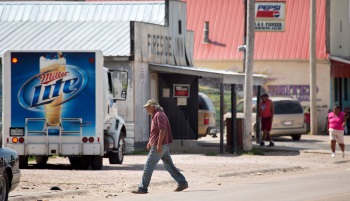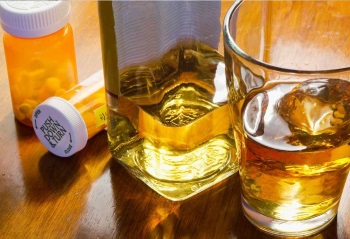Blog
Sober Heads Prevail: Minimum-Unit Pricing Upheld in Scotland
- Details
- Created: Tuesday, December 20 2016 18:55
 Scotland is getting closer to knocking out the bottom shelf. In late October, Scottish courts rejected a challenge to minimum unit pricing, a statute that sets a "floor" for alcohol sales. This floor is determined by the ABV, eliminating the market for the high-alcohol, low-price beverages that enable harmful drinking patterns.
Scotland is getting closer to knocking out the bottom shelf. In late October, Scottish courts rejected a challenge to minimum unit pricing, a statute that sets a "floor" for alcohol sales. This floor is determined by the ABV, eliminating the market for the high-alcohol, low-price beverages that enable harmful drinking patterns.
The appeal was brought by the Scotch Whisky Association, a trade group representing the £5 billion Scotch industry but largely funded by liquor giant Diageo. Diageo alone represents 24 Scotch whisky distilleries, but that is far from the extent of their holdings. Although Scotch is generally considered not subject to minimum unit pricing, Diageo's international brands include many low-price products in the developing world, and some critics suspect Diageo fears the Scottish Parliament's public health plan will set a precedent for similar statutes worldwide.
Diageo's opposition reads doubly ironic as they are also the backers of Stop Out of Control Drinking, a Scottish anti-alcohol campaign. Despite its mission, the campaign has refused to support minimum-unit pricing.
Prior to the victory in Scottish court, the statute withstood challenge in the coruts of the European Union. The ongoing litigation has been decried by members of the Scottish Parliament as a "stalling tactic." "This policy was passed by the Scottish Parliament unopposed more than four years ago," said Aileen Campbell, Scotland's Minister for Public Health. "In that time, the democratic will of our national parliament has been thwarted by this ongoing legal challenge, while many people in Scotland have continued to die from the effects of alcohol misuse."
The Scotch Whisky Association along with two other trade groups announced they will be appealing the ruling to the UK Supreme Court.
READ MORE about minimum unit pricing in Scotland.
Whiteclay Updates: Liquor Licenses Under Review - 12/20/16
- Details
- Created: Tuesday, December 20 2016 19:04
 Does Paying Millions to Police a One-Horse, Four-Liquor-Store Town Make Sense?
Does Paying Millions to Police a One-Horse, Four-Liquor-Store Town Make Sense?
In the midst of the ongoing public health and safety disaster in Whiteclay, NE, the four local liquor store owners have been asked to re-apply for their license to sell alcohol by the Nebraska State Liquor Control Commission. A legislative hearing last October revealed that Sheridan County, wherein Whiteclay is located, did not have enough law enforcement to adequately patrol the town. As adequate law enforcement is a prerequisite for the issuance of an alcohol license, the State Liquor Control Commission is expected to decide if the stores will be granted the licenses in late February.
In the meantime, the problems at Whiteclay continue. The town of 12 residents and four liquor stores remains a major source for alcohol—and alcohol-related harm—for the adjacent Pine Ridge Reservation. Health and safety threats attached to rampant alcohol abuse in the town include:
- Public Intoxication
- Selling alcohol to minors
- Using food stamps to purchase alcohol
- Physical abuse
- Liquor stores exchanging alcohol for sexual favors
- Prostitution
In addition, there have been five unsolved murders in Whiteclay. In neighboring Pine Ridge, one out of four children suffer from fetal alcohol syndrome.
one out of four children suffer from fetal alcohol syndrome.
The costs for enforcement, investigation, prosecution, and incarceration are bourn directly by Sheridan County. It is estimated that the county spends $1.7 million a year patrolling Whiteclay—a third of the county's budget. The taxes generated by beer sales, on the other hand, total a meager $120,000 yearly. This math does not add up—it doesn’t benefit the county, it doesn’t benefit the state, and it doesn’t benefit the residents of Pine Ridge. It only benefits High Plains Budweiser and the owners of the liquor stores.
TAKE ACTION: stand with the people of Pine Ridge Reservation to oppose the licensing of liquor stores in Whiteclay.
Surgeon General: "Never Too Early, Never Too Late to Prevent Substance Misuse"
- Details
- Created: Wednesday, December 21 2016 11:42
 Youth Especially Can Learn to Benefit From Alcohol-Free Life, According to DHHS Report on Addiction
Youth Especially Can Learn to Benefit From Alcohol-Free Life, According to DHHS Report on Addiction
In November 2016, the U.S. Department of Health and Human Services set the tone for the next generation of policies towards alcohol and addictive drugs with Facing Addiction In America: The Surgeon General’s Report on Alcohol, Drugs and Health. The report aims to confront the harm caused by illicit drug use, prescription drug misuse, and disordered drinking. In doing so, Surgeon General Vivek H. Murthy advocates an approach that emphasizes prevention, treatment, and integration of addiction services into standard healthcare. Just as importantly, Dr. Murthy pushes back against the dead-end of individual blame, bringing hope for pragmatic solutions to the estimated 20.8 million Americans in need of treatment for substance misuse—including the 15.7 million experiencing harm from alcohol use. (US Surgeon General's Addiction Website)
"It may surprise many people to recognize that alcohol leads to the other substances," said Dr. Murthy in an interview with PBS Newshour.
Central to the treatment strategy is the neurobiological model of addiction. In this model, addictive behaviors can be explained by a combination of dysfunctional reward systems in the brain and insufficient opportunities to build healthier ones. This quasi-disease model treats recovery as a retraining process, and likewise clears the way to prevention efforts.
If an individual experiencing that disease can retrain their reward circuits, quality prevention education and training can reinforce addiction resistance before the disease gets hold. At the same time, the report acknowledges that addiction emerges from a combination of drug exposure, quality of life, and genetic susceptibility; a sensible effort to combat addiction must identify and/or address all three.
In particular, Dr. Murthy singles out the age that someone first uses alcohol or other drugs as a risk factor for later misuse, emphasizing that “preventing or even just delaying young people from trying substances is important for reducing the likelihood of more serious problems later on.” The report encourages common-sense alcohol access regulations such as alcohol prices, restrictions on points of sale, and minimum purchasing ages, and urges they be extended to other legal recreational substances such as marijuana.
 Yet the report insists, “It is never too early and never too late to prevent substance misuse.” Aside from engaging youth, the report pushes all medical professionals to screen for alcohol and substance misuse. That includes primary care doctors, as well as psychiatrists and emergency personnel. These screens create opportunities to engage in non-emergency behavioral treatments, improving patients’ abilities to control problem use before it creates lasting harm. “With any other health condition like heart disease,” Dr. Murthy writes, “detecting problems and offering treatment only after a crisis is not considered good medicine.”
Yet the report insists, “It is never too early and never too late to prevent substance misuse.” Aside from engaging youth, the report pushes all medical professionals to screen for alcohol and substance misuse. That includes primary care doctors, as well as psychiatrists and emergency personnel. These screens create opportunities to engage in non-emergency behavioral treatments, improving patients’ abilities to control problem use before it creates lasting harm. “With any other health condition like heart disease,” Dr. Murthy writes, “detecting problems and offering treatment only after a crisis is not considered good medicine.”
Yet even when acute interventions are needed, “only 1 in 10 people with substance abuse disorders are getting treatment," Dr Murthy said to reporters. "That is unacceptable, and we have to close the gap."
For those who experience serious problems, the report recommends fully integrating substance abuse services with the existing medical and health insurance framework. Moreover, recovery can be a long process, and individuals need access not to just to acute detox but long-term “recovery support systems.” The systems include AA and other supportive groups, but also case management, sober living environments, and similar supportive spaces for people looking to reinforce an alcohol- and drug-free lifestyle.
"We're encouraged to see alcohol addiction given equal weight to other drugs of abuse," said Alcohol Justice Executive Director/CEO Bruce Lee Livingston, "and to see it implicated in worsening other addictions. We also strongly agree with the idea that prevention is the best solution—now government agencies at all levels must make good on the Surgeon General's words."
Although many of Dr. Murthy's recommendations seem common-sense to those familiar with evidence-based prevention and recovery, Dr. Murthy cautions that “this change will require a major cultural shift in the way we think about, talk about, look at, and act toward people with substance use disorders.” Yet the report is optimistic, citing the lifting of stigmas attached to HIV. AIDS, after all, was once regarded as a mysterious and terrifying plague. Now, it is just a disease to be treated.
More Articles ...
Subcategories
Help us hold Big Alcohol accountable for the harm its products cause.
| GET ACTION ALERTS AND eNEWS |
STAY CONNECTED    |
CONTACT US 24 Belvedere St. San Rafael, CA 94901 415-456-5692 |
SUPPORT US Terms of Service & Privacy Policy |


